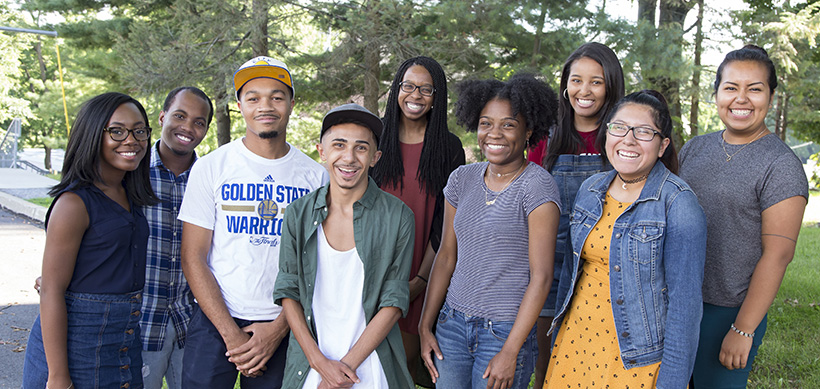In February 2017, we looked back on the individuals, initiatives and dreams that formed a path for the Muhlenberg we love today—and the Muhlenberg we hope and strive for in years to come. This four-part Black History Month series honors the past, celebrates the present and dreams for the future of Muhlenberg's diverse community. For more information on the Emerging Leaders program, visit our Student Life site.
Emerging Leaders
In 1988, Muhlenberg debuted Emerging Leaders, a program designed to orient first-generation students from underrepresented populations to a successful college experience. The pilot program provided a structured introduction to college life through a series of required workshops that focused on leadership activity and responsibility. Students were recruited on the basis of a strong record of high school leadership in community engagement and service, athletics or extracurricular activities.
In 2009, Kate Richmond, associate professor of psychology, and Cynthia Amaya Santiago '01, senior associate director of admissions and coordinator of multicultural recruitment, met with Carol Shiner Wilson, former dean of academic life, to relaunch the program with special attention to inclusive academic and community-oriented activities. The pair also developed a pre-orientation program and introduced students to various opportunities for on-campus employment and engagement.
The result, Jump Start (later re-branded as Emerging Leaders once again), was envisioned as a way to provide students a strong start to their college experience and provide them with the support to make their individual voices recognized among the larger campus body. The College’s Diversity Strategic Plan, debuted under the direction of President Emeritus Randy Helm in 2014, noted that the program had “helped to support incoming students as a hybrid bridge/leadership development program, and has also served as a catalyst for social justice activity on campus.”

Muhlenberg College's 2016 Emerging Leaders Cohort
Emerging Leaders has received increased attention and attendance in the years since its relaunch; in the 2019 class, over 30 students across two cohorts were enrolled at Muhlenberg as entrants to the program. At its heart, the program is structured as an academic-focused cohort, with emphasis on intellectual achievement, thoughtful curiosity and civic engagement.
Today, Emerging Leaders are part of a special pre-orientation program that includes a focus on the transition to college from high school; an academic mini-course for students to prepare for classroom interactions and expectations; a tour of Trexler Library and its resources; and an overview of the academic and other support services Muhlenberg offers to all students.
An integral part of the program includes multiple layers of mentoring, including key faculty, staff and peer participants. Early introduction to faculty mentors, including faculty and staff of color who can serve as role models in academia, is designed to show participants the depth of possiblity during and after their time at Muhlenberg.
Academic advising is a hands-on experience; students are expected to work with their advisor in a collaborative and consistent way throughout the two-year program. Students are encouraged to meet with their advisors every two weeks until they declare a major, which, for most students, happens during their sophomore year. They are encouraged to experience the full breadth of Muhlenberg’s liberal arts experience as they form their own path.
Emerging leaders are also enrolled with their peers in First-Year Seminars, small, interdisciplinary, discussion-oriented courses that provide entering students with the opportunity to work closely with a faculty member. Required of all first-year students and normally limited to an enrollment of 15, First-Year Seminars promote intellectual discussion and critical thinking, reading and writing skills.
Students are socially and professionally supported through close relationships fostered through the Multicultural Center; additional support, including professional networking sessions and career development workshops, are fostered through the Career Center. Participants are introduced to leadership opportunities on campus, including roles as a student government representatives, a writing assistant, peer mentors and tutors, orientation advisors and campus tour guides.
